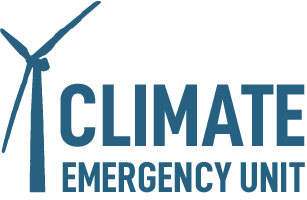Climate Emergency Leadership in Action
While Canada’s federal and provincial governments have yet to adopt robust climate emergency plans, there are leaders – some elected and others from the community – who are acting to confront the crisis and implementing true climate emergency policies. Here are a few of them…
City of Vancouver
In January 2019, Vancouver City Councillor Christine Boyle introduced a climate emergency motion (the first in English Canada). Thanks to support from student climate strikers, it passed unanimously. The motion resulted in a renewed city climate emergency plan that is the most ambitious in Canada. Vancouver’s GHG reduction targets now align with those urged by the Intergovernmental Panel on Climate Change, and the city has passed a package of policies to reach those targets, crafted by the city’s committed and visionary sustainability staff team. Among the city’s measures, new buildings will not be able to use gas or other fossil fuels for space and water heating as of 2022.
Councillor Christine Boyle, who wrote and brought forward Vancouver’s climate emergency motion, along with student climate strikers who rallied to ensure the motion passed
Chief Dana Tizya-Tramm of the Vuntut Gwitchin First Nation speaks during the declaration of a climate emergency in Old Crow on May 19. (Malkolm Boothroyd/Yukon News)
Vuntut Gwitchin Indigenous community of Old Crow, Yukon
The Gwitchin people of Old Crow, Yukon, see the impacts of a changing climate on their territory. Chief Dana Tizya-Tramm, elected chief of the Vuntut Gwitchin self government in 2018, is part of a new generation of elected Indigenous leaders committed not only to defending their people’s land and water, but to tackling climate change. Shortly after his election as chief, Tizya-Tramm introduced a climate emergency declaration, passed unanimously by the Vuntut Gwitchin council in May 2019. It highlights the agreement between what the IPCC finds and what the community’s elders report. It declares that “climate change constitutes a state of emergency for our lands, waters, animals and people.” The declaration commits the community to do what it can to keep global temperature rise below 1.5 degrees. The Vuntut Gwitchin climate declaration has become a model for all 11 Indigenous self-governing nations of the Yukon, who in February 2020, collectively signed a climate emergency declaration. The Vuntut Gwitchin declaration has also been shared with other Indigenous nations nationally and internationally across the Arctic.
And the Gwitchin of Old Crow aren’t just talking the talk. They are changing their own community’s energy use and driving down their GHG emissions. For decades, with no road to the community, Old Crow has been flying diesel in and burning it in a generator for electricity. Now they are building what they believe will be the largest solar farm in the Arctic, which they expect will produce enough electricity to meet a quarter of the community’s needs. They are investigating biomass and exploring the feasibility of a wind project. Tizya-Tramm wants to see his community beat the Paris commitment on a per capita basis, and ultimately, “We want to shut those diesel generators right off as soon as possible.”
Climate Caucus
Climate Caucus is a non-partisan network of over 300 local elected municipal climate leaders seeking to transform their communities over the next ten years. Founded by Nelson BC City Councillor Rik Logtenberg, Climate Caucus brings together councillors, mayors, and regional directors throughout Canada who are committed to implement socially-just policy that aligns with IPCC science.




